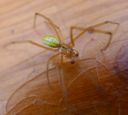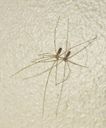Psilochorus
Psilochorus
Classification
- Phylum: Arthropoda
- Subphylum: Chelicerata
- Class: Arachnida
- Order: Araneae
- Infraorder: Araneomorphae
- Family: Pholcidae
- Genus: Psilochorus
Pronunciation
How to pronounce Psilochorus: /ˈsɪloʊkɔːrəs/
These audio files are automatically generated. While they are not always 100% accurate, they are a good starting point.
Images






Summary
Psilochorus simoni is a cellar spider known for its dome-shaped web and is typically found in habitats like wine cellars and greenhouses. It plays an important role in controlling insect populations.
Physical Characteristics
Typically creates a tidy, dome-shaped web; slender and elongated body.
Identification Tips
Look for a dome-shaped web characteristic of cellar spiders.
Habitat
Often found in wine cellars, garden centers, and greenhouses.
Distribution
Primarily found in the United States; introduced in Europe, Turkey, and New Zealand.
Diet
Insects and other small arthropods caught in its web.
Life Cycle
Details on specific life cycle stages not provided, but includes typical phases of egg, juvenile, and adult.
Reproduction
Information on reproduction methods not specified.
Predators
Unknown specific predators; may include generalist insectivores.
Conservation Status
Not listed, may be common in suitable habitats.
Ecosystem Role
Helps control insect populations by preying on them.
Economic Impact
Beneficial for natural pest control in agricultural and greenhouse settings.
Cultural Significance
Named 'Wine Cellar Spider' due to its association with wine storage areas.
Health Concerns
No specific health concerns noted; generally considered harmless.
Collecting Methods
- Hand collection
Preservation Methods
- Drying
- Pinning
Evolution
Part of the Pholcidae family, which adapted to cave and cellar environments.
Similar Taxa
- Other species in the genus Psilochorus
- Other cellar spiders
Misconceptions
Often misidentified as more dangerous spiders; they are generally harmless to humans.
Tags
- Psilochorus
- cellar spider
- arachnology
- Pholcidae
- insect control
- USA